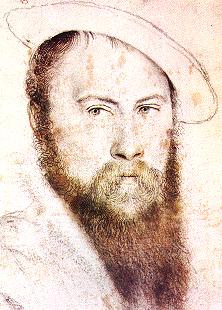Thomas Wyatt (poet)
|
|
 |
Sir Thomas Wyatt (1503 – October 6, 1542) was a poet and Ambassador in the service of Henry VIII. He first entered Henry's service in 1516 as 'Sewer Extraordinary', and the same year he began studying at St John's College of the University of Cambridge. He married Elizabeth Brooke (the daughter of Lord Cobham and of royal descent) in 1521 and a year later she gave birth to a son, Thomas Wyatt, the younger, who led Wyatt's rebellion. In 1524 Henry VIII assigned Wyatt to be an Ambassador at home and abroad, and some time soon after he divorced his wife on the grounds of adultery.
Wyatt's sister was one of Anne Boleyn's closest friends, and later chief ladies-in-waiting. Wyatt himself fell violently in love with the young Anne Boleyn in the early-to-mid 1520s. His grandson later recollected that the moment he had seen "this new beauty" on her return from France in winter 1522 he had fallen in love with her. He wrote several love poems and became one of Anne's many suitors. However, although gossips would later allege the two had been lovers, Wyatt himself claimed that of all the men who had fallen for Anne he was "the furthest behind". Furthermore, Anne was ambitious and had learnt from her sister, Mary Boleyn's, example and was discreet and chaste when it came to handling her male suitors. She unwittingly attracted King Henry VIII's attentions sometime around 1524, and Wyatt was the last of Anne's other suitors to be ousted by the king. After an argument over her during a game of bowls, Wyatt was sent on a diplomatic mission to Italy.
He accompanied Sir John Russell to Rome to help petition Pope Clement VII to grant Henry VIII a divorce from his first wife, Catherine of Aragon. Wyatt was captured by the armies of Emperor Charles V when they captured Rome and imprisoned the Pope in 1527. Wyatt managed to escape however, and made it back to England.
In 1535 he was knighted, and in 1536 he was imprisoned in the Tower of London for quarrelling with the Duke of Suffolk, and also under suspicion of being one of Anne Boleyn's lovers. He was released from the Tower later that year, thanks to his friendship with Thomas Cromwell, and he returned to his duties. During his stay in the Tower he witnessed the execution of Anne Boleyn, and he wrote a poem inspired by the experience V.Innocenti Veritas Viat Fides Circumdederunt me inimici mei (http://www.luminarium.org/renlit/innocent.htm)
In 1541 he was charged again with treason and the charges were again lifted. However, only thanks to the intervention of Queen Catherine Howard, and upon the condition of reconciling with his adulterous wife. He was granted a full pardon and restored once again to his duties as Ambassador. He became ill not long after, and died in September 1542. None of Wyatt's poems were published during his lifetime - the first book to feature his verse was printed a full fifteen years after his death. He and Lord Henry Howard were the first poets to use the form of the sonnet in English.
